Peter MALONE
Saturday, 18 September 2021 19:56
Associate, The
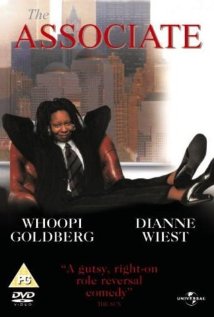
THE ASSOCIATE
US, 1996, 114 minutes, Colour.
Whoopi Goldberg, Dianne Weist, Eli Wallach, Tim Daly, Bebe Neuwirth, Austen Pendleton, Lanie Kazan, George Martin.
Directed by Donald Petrie.
There is a lot to like in The Associate, although it is a mixed bag of drama, comedy and satire. Like Jerry Maguire, it is sending up the world of greed and success, but relies on money and success for its resolution, along with some deceit along the way.
Whoopi Goldberg is a Wall St financial expert but is continually passed over because she is a woman (and she is, of course, black). She devises a scheme to make her mark in the market - which has great potential for farce and it is often funny: she invents a male partner, both genius and recluse. It depends on one's attitude is towards the frenzy of deals and money-making whether one finds this kind of satire effective or not.
It is a particularly American phenomenon, but spreading. However, the opportunity to see a woman show up such chauvinistic men is worth taking. Money talks.
1. An American comedy based on a French film of the 1970s? An adaptation to the US, to the 1990s?
2. The female perspective, employment, leadership, business?
3. The New York story, Wall Street, the 1980s and 1990s and the decorative greed? Companies, associates, directors? Men’s world?
4. New York City, offices, mansions, lavish style, dinners, hotels, award ceremonies? A social world? The musical score?
5. The title, the irony that the invisible associate was a man partnering with a woman?
6. Whoopi Goldberg, her screen presence? Dianne Weist? The supporting cast?
7. Laurel, Whoopi Goldberg style, her age, experience, financial skills? Advisor to Frank, his treatment of her? Her ideas, advice? Manchester and the possibility of promotion? The trip to the strip club with the businessman, the response, Frank urging them on, the sleazy atmosphere for doing business, laurel unable to present ideas? Frank and the applause with him settling the account? Laurel losing the promotion? Her reaction, francs double cross, her leaving?
8. Male chauvinism, Frank, Manchester? Fallon? The role of Wizard women in the business offices, secretaries, sexual liaison is? Allegedly open-minded but consulting their partners and refusing women’s advance?
9. Sally, her work, and admiring laurel, her reactions, working from Frank? The discussions with laurel, coming to her house, the encouragement, the ideas, the connections?
10. Laurel, inheriting the house with her father, a lavish base for her company? The range of consultations, rejections, consultation of partners?
11. Setting up a company, the opportunity of meeting Franklyn after overhearing him in the diner? His reaction? Her explanations? Going to see Don Fallon, his chauvinist attitude, listening to her, examining the documents? Her decision to create Robert Cutie? Fallon accepting, the check, sight unseen?
12. Setting up the building, Sally and her advice, ideas, the job, the ideas box and computerisation?
13. The consequences of inventing Robert Carty, the range of excuses for his absence, being away, no publicity, travel? Wall Street interest in Robert Carty?
14. Laurel, her skills, the luck with Franklyn, her surmises, Fallon benefiting? Disrepute, everybody talking about, wanting to see him?
15. Franklyn, about to be bankrupt, laurel’s advice, his demonstrating his goods, others investing?
16. Camille, her role in the office, her letters to Carty, her sexual role?
17. Frank, his having to take a backseat, his ambitions?
18. The investigation, the FBI, the agent coming to interview laurel?
19. The buildup to the award, cut his reputation, Cindy Mason, who articles, broadcast, wanting to interview him? Attempts to waylay him?
20. Laurel’s cross dressing friend, the impersonations, the clamour, giving them a, to create Robert Cutie?
21. Cut his arrival, everybody excited, his speech, Camille in the room, the advances, his telling her to use her brain? His escape?
22. Everybody’s reaction, the possibility of seeing Cutie? Laurel, the make-up, her manner, age, masculine behaviour? Laurel still supplying the ideas? Sally
and her work?
23. The award, cut his arrival, Frank and his claims to be a friend, Cutie kissing him? The unmasking, the club with men only, the applause, Camille fainting,
Cindy Mason and her affirmation?
24. Serious issues, comedy, touches farce, satire in the 1990s? Subsequently?
Published in Movie Reviews
Published in
Movie Reviews
Tagged under
Saturday, 18 September 2021 19:56
In the Navy
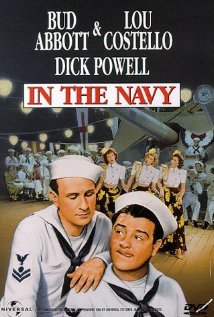
IN THE NAVY
US, 1941, 86 minutes, Black and white.
Bud Abbott, Lou Costello, Dick Powell, Claire Dodd, The Andrews Sisters, Dick Foran, Shemp Howard.
Directed by Arthur Lubin.
In the Navy was a Buck Privates’ film, following on the very successful Abbott and Costello comedy, Buck Privates where they were GIs in the army.
Bud Abbott and Costello had appeared as supporting cast in One Night in the Tropics and they was so popular that they made several films during 1941, including Hold That Ghost.
There is a sub-plot concerning Dick Powell as a popular crooner who wants to get away from the fans and adulation and join the Navy anonymously. Claire Dodd portrays a journalist who wants to write an expose story, taking every opportunity to photograph him, including stowing away on a ship.
Abbott and Costello portray workers in the Navy, never having gone to sea, but involved in all kinds of shenanigans and training.
As usual, there are a number of verbal routines, one always concerning money and Abbott getting the better of Costello, as well is a routine where Costello tries to prove that 7×13 = 28.
While Dick Powell had been a singer in films of the 1930s, he does get an opportunity to sing here. But, one of the main features is the presence of The Andrews Sisters who appeared in other Abbott and Costello films, including Buck Privates and Hold That Ghost, who sing several numbers, but also have some speaking parts, especially Patty who is in correspondence with Costello who puts all kinds of false information into the letters, disillusioning her when she sees him.
There are some adventures on sea in the last part of the film, with Costello as captain of the ship. The report was that Navy officials found this offensive but that the sequence was already in the finished film – with Universal turning it into a dream sequence.
The film was one of the most popular of 1941.
Published in Movie Reviews
Published in
Movie Reviews
Tagged under
Saturday, 18 September 2021 19:56
Danny Collins
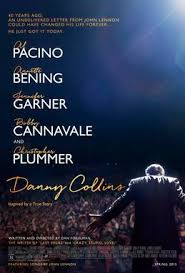
DANNY COLLINS
US, 2015, 106 minutes, Colour.
Al Pacino, Annette Bening, Jennifer Garner, Christopher Plummer, Bobby Cannavale, Josh Peck, Nick Offerman, Giselle Eisenberg.
Directed by Dan Fogelman.
There is a lot going for Danny Collins, not the character himself until the middle of the film, but for the film itself. It is well written by the director, Dan Fogelman, and it is very well acted by a strong cast, led by Al Pacino. There is quite a bit of sentiment, but sentiment which most audiences will like.
And, of course, the question is who is Danny Collins. He is a singer and a composer. In a sequence set in 1971, we see the young Danny Collins being interviewed for a popular magazine. Then we get some idea of his career as a singer, with a series of posters and album covers (all featuring photos of Al Pacino when he was young or in some of his famous films, including The Godfather).
So, we come to 2014 and he is on tour, singing the songs that have been popular over the decades with a rather wide fan base, but more and more relying on silver-haired ladies (referring to some of them as The Golden Girls in the front row). He is older, has become tired, yet still playing to his fans.
Christopher Plummer, in an engagingly sardonic performance, plays Danny’s manager, friend and adviser, who becomes exasperated with Danny’s behaviour. When Danny gives up his tour and decides to go to search for his son he has never met, he moves into a New Jersey hotel which is presided over by straightlaced manager, played effectively by Annette Bening. Danny uses his charm, encouraging the young man at the door who does valet parking, with the young woman behind the desk, and develops a patter kind of conversation with Mary, the manager.
One of the important thing is that he takes his tour bus to a suburban street to the home of his son, the son of a one night stand, with the son hating the father has never met but has seen on television. Danny finds his pregnant daughter-in-law, Jennifer Garner, and a precocious granddaughter who has attention deficit behaviour. The son is played very effectively by Bobby Cannavale, who has his own life but has not got over overcome his anger, his rage, towards his father.
Danny becomes more and more involved in the life of the family, sponsoring a trip to New York City to see an expert doctor on attention deficit and offering to pay for his granddaughter’s tutoring. He also becomes involved with his son’s ill-health, again financing treatment and being supportive when he is to hear the final verdict on prospects for his health.
In the meantime, perhaps with the attraction to Mary, Danny begins to compose a new song. He wants to launch it during a gig arranged at a local club – but, after his attempt to sing, with Mary encouragingly present as well as the family, it is the ageing fans who urge him to go back to sing his most popular song. Danny had been in a relationship with a young woman half his age and she turns up with her boyfriend and persuades him to start drinking and taking cocaine again.
Where can Danny’s story go?
The deus ex machina, so to speak, is his manager’s finding a letter that John Lennon had written to Danny after reading his article in the magazine in 1971. Danny had never received the letter but is so touched in 2014 that it is the catalyst for him to think about changing his life. In fact, the screenplay is based roughly on a true story about British singer, Steve Tilston, who did receive such a letter from John Lennon, many of whose songs play through the film.
One pleasant thing about the finale of the film is that it has a certain ambiguity, the audience and the characters uncertain as to what is to happen but the smart dialogue just giving a small indication of what will happen either way and audience satisfaction in hearing the final result.
A likeable film, which did not receive a wide release, but would please an adult audience.
1. A strong story, performances, dialogue? The cast?
2. The 1970s, the office and the interview? 2014, the two, homes, hotels, New Jersey, the doctor’s office, concerts?
3. The musical score, the music, the songs, popular, classics? The use of the songs of John Lennon?
4. The title, the focus on Danny Collins, as young, the interview, the interviewer, the interest, the magazine article? The background Danny Collins story, the decades, music, concerts, success, his characteristic songs, the three marriages, drugs, drinking? His friendship with Frank, the bond between them? The Baby Doll song and the audiences, growing grey-headed?
5. Frank, Christopher Plummer, friendship, advice, sardonic observations, the money issues, supporting Danny? The later revelation of the story, Frank’s drinking, the car accident, and drying out, Danny and his visits, payments, the bottled water gift? Saying that Danny was a man of great heart – but it was up his ass?
6. Frank bringing the letter from John Lennon as a gift, the effect on Danny, the impetus to change? His wondering if he had received the letter earlier? What if…?
7. Danny, the concert and performance, the effort to go on stage? The friends? His act on stage, the dance, reaching out to the audience? Sophie at home, half his age, the relationship, Frank’s critique? The man at the gate, his later bypassing the gate, discovering Sophie with the lover? His leaving?
8. The Danny Collins bus, into suburban New Jersey, knocking at the door, Samantha and her amazement? Meeting Hope? Tom and his mother, the history, his not knowing Tom? The gift of the bagels, talking? Samantha and her pregnancy? Hope and her ADHD behaviour, excitement, talk? Tom returning, the talk, his anger, ousting Danny?
9. Danny going to the Hilton, his friendship with the boy at the door, the girl at reception, nice faces? His meeting Mary, inviting her to dinner, the refusals? Living in, bringing the piano? His composing at the piano? Attempts to change his life? The return after the visit to Tom, his drinking, Mary and her response? The tequila?
10. Mary, her personality, and managing the hotel, the story of her daughter, her ex-husband? At work, severity? The interactions and the pattern between them? Her response to the song?
11. Danny turning up at the house, the information about the doctor in New York City, for Hope? Sam and Tom and the reactions? Persuaded to go? The
specialist, the long waiting list? The doctor’s welcome, the tour, Danny and the cost?
12. The revelation of Tom and his leukaemia, not telling Samantha, the excuse of going to Delaware, the weeks of treatment? Danny and his presence and support?
13. Danny and the gig, trying out the song, the audience not responding? Frank’s organisation? Danny and his being anxious, going on stage, changing to the popular song, the response of the audience, Mary not singing? The family response?
14. Sophie and her lover turning up for the concert, his taking the drugs, Tom’s reaction, Danny returning, Mary’s reaction, wanting him gone?
15. His leaving, the gift of the car to the boy, urging the boy and girl to be together, their presence of the concert? His tidying the room, leaving?
16. The piano, Danny going on to, the piano going to Tom, in the house, playing the piano with Hope?
17. Danny, with Tom, with the doctor, waiting to see whether he would be referred to formally or as Tom? The sudden hopeful ending?
18. The future and hope and Hope?
Published in Movie Reviews
Published in
Movie Reviews
Tagged under
Saturday, 18 September 2021 19:56
Partisan
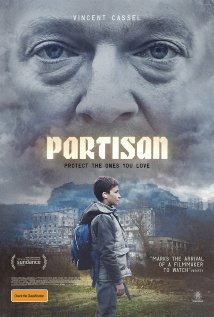
PARTISAN
Australia, 2015, 98 minutes, Colour.
Vincent Cassell, Jeremy Chabriall, Florence Mezzara
Directed by Ariel Kleiman.
Partisan was made by Melbourne director, 28-year-old Ariel Kleiman. It is an ambitious film which has played in festivals and received acclaim. Specialist audiences will admire it but it may be too specialised for the general public.
The film has the added advantage of the presence of celebrated French actor, Vincent Cassell. He plays an enigmatic character, Gregori, who is seen at the beginning of the film solicitous about children, about a young woman who is to give birth, his fascination with the child. Then time passes and we see Gregori with many children.
What has happened is that Gregori has set up a kind of commune which is more akin to a cult experience with him serving as guru, with some sinister overtones. He is father and father-figure, educating the children, rewarding them for their efforts, giving them gifts, karaoke singing and jollity. But, there is something very sinister about him.
The children are being trained in all kinds of practical matters, mechanics, mathematics. But they are also being educated to be potential assassins, given guns, having target practice, being commended for their efforts.
But it is one boy, Alexander, Gregori’s son, who is expert, especially in the use of guns and even a killing which is vividly shown the motivation never explained. But, there seem to be seeds of doubt in Alexander’s mind as he deals with the other boys, the other boys and girls, and Gregori’s special tuition.
This explanation of some of the plot lines may be clearer than the experience of actually watching the film itself. At times, it seems quite obscure, the audience having to work hard to listen to the dialogue, observe the performances, to try to work out what is exactly happening in Gregori’s mind, in his behaviour, as well as the response of the children and of the women who play a supporting role in the commune.
The other significant element is the location of the commune common – the filming was done in the central Asian country of Georgia, with a war-torn atmosphere, and ordinary towns and suburbs outside, but the commune is partly established in some of the ruins of action.
While one admires the skills and talent of the director, admiration is the keyword rather than personal involvement in the story – despite the intriguing aspects of Gregori’s character and the fine performance by the young Jeremy Chabriell as Alexander.
1. The title? Partisans for which country? Grigori as a partisan, Alexander, the community?
2. The Eastern Europe setting, the anonymous nation, the city, the commune? Visuals, the homes within the commune, the children playing? The look of the commune? Musical score?
3. The director, Australian, the European perspective? Festival awards?
4. Grigori, his story Western Mark introduction to him, age, his look, occupation, with the children? The children and their backgrounds? His wife, giving birth, his presence, his delight in the child? The child and its destiny?
5. The passing of the years, good gory and the development of his character, his wife, his being busy, making things, his love of his son, demands on him? The training, the jobs, buying at the store, the guns, the network Western Mark
6. the boy and his life, relating to his parents, the influence of his father, his friends, playing, getting dressed true function but getting out the window and playing soccer? His father’s reaction, discipline Western Mark the boy’s intelligence, knowledge, guns, the practice, his skills? The actual missions, his going out, shooting people?
7. The mothers, the children, the new mother and her baby, working together, living the life of the commune Western Mark the attitude towards the role of women?
8. The children, community life, ordinary, playing, the training, the shooting – and the intentions for their destiny?
9. Grigori, shaping the minds of the children, as a guru, is a cult leader, his expectations?
10. Alexander, growing up – and the questions of his future?
11. The director saying that the narrative was only from the point of view of Alexander? A child’s limited view – and audiences supplying the background?
Published in Movie Reviews
Published in
Movie Reviews
Tagged under
Saturday, 18 September 2021 19:56
Road to Zanzibar

ROAD TO ZANZIBAR
US, 1941, 91 minutes, Black and white.
Bing Crosby, Bob Hope, Dorothy Lamour, Una Merkel, Eric Blore, Douglass Dumbrille.
Directed by Victor Schertzinger.
Road to Zanzibar is the second in the Road series bringing together Bing Crosby, Bob Hope, Dorothy Lamour.
The film is something of a satire on jungle movie set in Africa, Hollywood not really knowing anything about Africa, contriving all the scenes in the studio.
Bing Crosby and Bob Hope portray two performers, Hope always the victim, being fired off in a canon (and it is a dummy) but it sets fire to the circus marquee. They go on the road throughout Africa, doing variations, the human bat, fighting a gorilla, with newspaper headlines that Hope survives.
Eventually they are tricked by a genial Englishman who sells them a map of a diamond mine – only he doesn’t have one. The pair also get tangled up with two criminals and have to flee throughout Africa. They are also tricked at a slave market where Dorothy Lamour poses as a slave and the pair pay money for her release, only to find that she is in collusion with another showgirl and they decide to take all the money from the pair and the mine. The girls schmoozing up to the two but are all intent on bringing them down. At one stage, Dorothy seems to have been eaten by a leopard and they perform a funeral rite, trying to recite poetry over the remnants of her clothes.
Eventually, all turns out well, with the help of some of the African locals – straight from central casting.
As always, Bing is the smooth entrepreneur, able to put pressure on Hope, persuade him to do what Bing wants, capitalising on his cash. And, as usual, there are a number of songs, romantic songs as well as patter songs.
This film set the pattern for a number of sequels, including the road to Road to Utopia and Road to Rio, and, perhaps the most famous, Road to Morocco.
Published in Movie Reviews
Published in
Movie Reviews
Tagged under
Saturday, 18 September 2021 19:56
Man on the Eiffel Tower, The

THE MAN ON THE EIFFEL TOWER
US, 1949, 97 minutes, Colour.
Charles Laughton, Franchot Tone, Burgess Meredith, Robert Hutton, Jean Wallace, Patricia Roc, Belita, Wilfred Hyde White.
Directed by Burgess Meredith.
While this film has an excellent cast and features the city of Paris is one of the cast, it is something of a lame duck interpretation of the Georges Simenon story.
Certainly, Paris looks very good, especially the Eiffel Tower with the preposterous chase, the villain climbing the exteriors of the tower, a character with poor eyesight following him, a melodramatic ending which might work better in the imagination then on the screen.
The film features Charles Laughton as the inspector, Laughton bringing his engaging idiosyncrasies to an unexpected police Inspector, satisfied with observing his prey rather than a great deal of exertion. Because his prey is a vain man, a psychopath who has made himself available for a price to murder a playboy’s aunt so that he can get an inheritance and who flaunts his guilt in the face of everyone, it is a matter of watching till the man gives himself away and can be arrested. He is played by a considerably older-looking Franchot Tone, different from his films and debonair roles of the 1930s.
Irwin Allen began work as director but Burgess Meredith took over – allowing himself to give quite a hammy performance as market seller with poor eyesight who gets entangled with the murder, threats from the murderer, going to prison, set up to escape so that the inspector can follow him. British actress, Belita, plays his wife. The other women in the cast are Patricia Roc as the playboy’s wife and Jean Wallace as his mistress. He is played by Robert Hutton. There is also a guest role from Wilfrid Hyde White as an expert interviewed by the inspector.
Definitely a curiosity item – along with The Man Who Watched Trains go By, another Simenon story from the same year featuring Claude Rains.
1. The popularity of the detective story by Georges Simenon, Inspector Maigret? Crime, French settings? an English version?
2. The strong cast, international? Burgess Meredith directing?
3. The city of Paris as a member of the cast? The tourist views, the range? The climax on the Eiffel Tower?
4. The situation, Bill Kirby, playboy, meeting his wife, his relationship with her, his mistress turning up, the friendship between the two women? The
discussion in the bar, waiting for his inheritance from his aunt, his being overheard, the note on the floor?
5. Radek, sitting in the bar? His character, Czech background, the war? In Paris? Self-assured? The note, following it up, the murder of the aunt and the
maid? Heurtin and his presence, the glasses are not able to see, Radek treading on them? The threats, allowing Heurtin to go to prison, arranging an escape? His reputation, appearances, taunting Heurtin, taunting Maigret, vanity, in full view?
6. Heurtiin, his wife, the work at the market, his eyes and his glasses? At the scene of the murder? Fear, the deal, going to prison? Interrogated by Maigret? Maigret organising his escape, following him? Eluding him? The confrontation with Radek, the threats? The role of his wife?
7. Bill Kirby, his wife and her being hurt, his mistress and her interest in his money?
8. Maigret as a character, Charles Laughton and his style, his persistence, the methods, the authorities? Following Radek, searching for Heurtin? Using
the mistress to help solve the case? The setup?
9. Radek, in the trap, leaping to escape, with Heurtin, on the Eiffel Tower, the melodrama of the chase, his claim, fall? Maigret watching? His being arrested?
10. Maigret satisfied? Radek going to his execution – and the quip that Maigret could not follow him there?
11. How interesting an interpretation of a Simenon story?
Published in Movie Reviews
Published in
Movie Reviews
Tagged under
Saturday, 18 September 2021 19:56
Beloved Sisters/ Die geleibten Schwestern
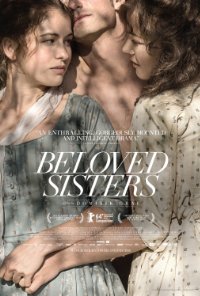
BELOVED SISTERS/ DIE GELEIBTEN SCHWESTERN
Germany, 2014, 138 minutes, Colour.
Hannah Herzsprung, Florian Stetter, Henriette Confurius, Claudia Messner, Ronald Zehrfeld.
Directed by Dominik Graf.
Beloved Sisters is a portrait of the writer, Friedrich Schiller, one of the key thinkers of the German Enlightenment, along with such other writers such as Goethe.
This portrait, directed by eminent German director, Dominik Graff, is a blend of romance and biography as well as an attempt to indicate the stature of Schiller in the period. However, the emphasis seems to be more on romance and relationships, Schiller and his link with the two sisters, the menage a trois established with them, rather than an exploration of his literary talent and his thinking.
There is a lot of acclaim about Schiller and his reputation, especially the sequence where he gives the key lecture in history, crowds present, to great acclaim – however, the screenplay gives little indication of the content of his lecture.
Schiller encounters two sisters during a period of ill health. Both of the sisters fall in love with him. The sisters are very close in their own relationship and are comfortable, each of them, having a passionate relationship with Schiller and with the menage a trois. One of the complications is that the older sister is already married, a cold husband, wanting a divorce and finally getting one. The other sister is unmarried and eventually marry Schiller and has a child.
One of the attractions of the film is its recreation of the 18th century in Germany, costumes, decor, design as well is the musical score.
However, the pacing of the material and the less than compelling drama of the relationships means that the film seems very long and the less persuasive for being so. It is a film for those who want to know something about Schiller and some themes from the German Enlightenment.
1. The blend of historical drama and romance?
2. The style of the film, more like a mini-series rather than a cinema drama?
3. The 18th century, Weimar, the areas of Germany? Costumes, decor, design? The world of the wealthy, the ordinary? Homes, universities, the countryside?
4. The score and atmosphere?
5. Audience knowledge of Schiller, his prestige, among the writers of the period, the Enlightenment, German literature, poetry, history, philosophy? How much was incorporated into the film? The content of his key lecture on history?
6. The personal portrait of Schiller, his age, experience, expelled by the authorities, his later return? His health, the encounter with the women, the attraction, with each of the two sisters, with their mother? The menage? The years passing, the details of the relationship? The genuineness of this love of each sister? The women’s mother and her influence?
7. The portrait of the two sisters, their ages, one married, the other not? Their experience, the influence of their mother? The inheritance? The scenes with Schiller, each loving him? The years passing? Charlotte staying, marrying, the child? Caroline, her marriage, her intensity, yet her cold husband, alienation? The different moods and crises? The absence?
8. The range of friends, society?
9. The mother, her visit, her demands, her death?
10. The years passing? Caroline and her absence the years? Her relationship with help Willhelm? His friendship with Schiller?
11. Into the 19th century, Schiller, his illness, the care for him, his death?
12. Schiller’s place in German history, literature?
Published in Movie Reviews
Published in
Movie Reviews
Tagged under
Saturday, 18 September 2021 19:56
Reign of Terror/ Black Book
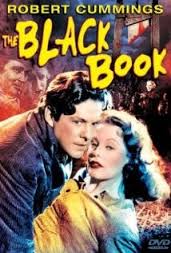
REIGN OF TERROR/THE BLACK BOOK
US, 1949, 89 minutes, black and white.
Robert Cummings, Richard Basehart, Richard Hart, Arlene Dahl, Arnold Moss, Norman Lloyd, Charles Mc Graw, Buelah Bondi, Jess Barker.
Directed by Anthony Mann.
The Reign of Terror, also called The Black Book, had a theme which was popular in small historical thrillers at the end of the 1940s, films about Cagliostro, Black Magic, and the French Revolution.
This is an early film by director Anthony Mann and showed his abilities as director, working on a number of westerns with James Stewart during the 1950s and then moving on to bigger budget films including The Fall of the Roman Empire.
What is particularly striking about the film is the set decoration by celebrated designer, William Cameron Menzies, who won a number of awards, designed such films as Things to Come and also directed some small-budget films.
Robert Cummings is not the actor that one would expect for the central role but carries it off with some aplomb. Arlene Dahl was very popular at this time. But the film belongs to Richard Basehart with his intense performance as Robespierre, showing his mania, his self-delusion, his desire to be dictator for the sake of the people until his downfall.
1. A Hollywood interpretation of the French Revolution and the Reign of Terror?
2. Black-and-white photography, the stylised sets, light and shadow, photography angles, close-ups? An intensity in the production? The musical score?
3. The title, the period in France, Robespierre and his move towards dictatorship, his black book with the names for victims?
4. The focus on Robespierre, his role in the Revolution, the confrontation with Danton at the beginning, the many executions, the confrontation with Barras, his relying on Fouchet and the secret police? His not trusting people? Except Saint Just? His ideas about himself, his talk about the will of the people, his maintaining his fidelity to the beliefs of the Revolution? His killings, the guillotine? Presence in Parliament? His wanting the book, trusting Charles but believing him to be someone else? The intrigues? People rising up against him? His condemnation and his own execution?
5. Charles, in disguise, taking the place of the agent from strasbourg? His past relationship with Madelon? Distrusting her? His movements, infiltrating, the contact with Robespierre, the commission to find the book? His speculation that Robespierre had it and was holding it as a threat? The various adventures, the fights, Fouchet, Barras, being rescued by Madelon? The revival of his love? The discovery of the book?
6. Madelon, working under cover, relationship with Charles, falling out, the resumption of the relationship? Her rescuing him from dangerous situations? Prison? The coach and the ride?
7. The revolutionaries, their stances, against Robespierre? The secret police? Fouchet, his double dealings? Barras as Robespierre’s target?
8. The end, the innkeeper, the identification? St Just and his relationship with Robespierre? Ruthless?
9. Bringing the agent’s wife from Strasbourg, Madelon disguising herself, kissing Charles, the later arrival of the actual wife? The pursuit, the wagon in front
of the coach? The escape?
10. The ending with the downfall of Robespierre? And the romantic ending?
11. The irony of the arrival of Napoleon? Subsequent French history?
Published in Movie Reviews
Published in
Movie Reviews
Tagged under
Saturday, 18 September 2021 19:56
Unfriended

UNFRIENDED/ CYBERNATURAL
US, 2015, 83 minutes, Colour.
Shelley Hennig, Moses Storm, Renée Olstead, Will Peltz, Jacob Wysocki, Courtney Halverson, Heather Sossaman.
Directed by Leo Gabriadze.
In Poltergeist, the evil powers are inside a television set or, at least behind a television screen. This time they are in the worldwide web, operating through the Internet, through chat rooms and through Skype.
The title has literal as the young people communicating on their computers have an experience of being unfriended. But, the working title of the film was Cybernatural which rather appeals as a play on cyberspace and supernatural influences.
Who would have thought that we would have a film where the camera focused entirely on a computer screen? This is the experience of those who spend hours in front of their computer, looking at, staring at, becoming involved… However, there is quite some action in the film, but always within the computer screen, Skype images of each of the young people, You Tube and video clips, so that the film keeps up its pace.
At the opening, the young woman is flirting with her boyfriend, but soon a number of friends are introduced. The context is the suicide of another young woman, after a party, with the suggestion that she was bullied and took her life.
Each of the friends has an association with the dead woman but plead innocence. As the film progresses, a mysterious member starts to contact them all, entering via chat rooms, with the Internet address of the dead woman.
As we might imagine as the film goes on, each of the friends is going to be eliminated. The malevolence makes its way through the Internet and dramatically takes its toll. The drama is in finding out what the connection with each victim was to the dead woman, who will be next and whether anyone will survive. To that extent, the film follows a not unusual pattern of elimination deaths.
Gradually, the characters of the participants are revealed, not very likeable at all.
The mysterious communicator invites them all to play a game, that they have to answer a question truthfully within a fixed time otherwise they are the loser. They have to hold up their hands to camera, putting down a finger each time they fail with their answer. The question is a very personal, revealing a nasty side to each of the characters, including the two flirting at the opening.
The film also shows on the You Tube clips what actually happened to the girl, how she was sick, defecated, with everybody laughing at her, humiliating her. Obviously, she is going to have the last laugh.
The film is contemporary in its preoccupation with information technology, young people and social media, the amount of time and energy invested in being online, the emotional consequences.
And the other message of the film is a warning against bullying and its devastating consequences – this time not only to the victim but also for the victimisers.
1. Cybernatural, and its overtones? A horror story, ghosts, through computers and Internet? The title?
2. The fixed camera, on the computer screen? The effect for the audience? Using Skype, image and conversation, multi-images, reactions and drama, appearance and disappearance? Texts and replies? Chat? The use of Youtube?
3. The situation, Laura and her suicide, seen on the Youtube clip, the bullying, the mockery, her lying on the ground, soiled? The repeat of these scenes?
4. The six characters, their age, experience, relationships, sexualities, drugs, lies?
5. Billie and her using Laura’s address, account? Her interventions? Words and accusations? Reactions? Ken and his trying to find solutions?
6. The game, willing and unwilling to play, holding up five fingers, denials and a finger going down, losing five fingers and being the loser? The timing of the questions and for the response?
7. The secrets? Val, relationship with Laura, her early death? Ken, his participating, the attack on him, arm in the blender, the view truth through the lattice? Jessie, relationships, reporting people to the police, drugs? Adam and his sexual relationships, the issue of abortion, betrayal, his interactions with Mitch? Reports and jealousy?
8. Blaire, the opening, the relationship with Mitch, being suggestive, the chat and her fears? Mitch’s reactions? Blaire and her laughing at the soiled Laura? Revealed at the end? Her death?
9. The film as a contemporary moral fable with lessons, especially about obsessions with computer and Internet, and, more especially, about bullying?
Published in Movie Reviews
Published in
Movie Reviews
Tagged under
Saturday, 18 September 2021 19:56
One Night in the Tropics
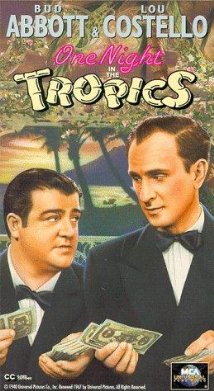
ONE NIGHT IN THE TROPICS
US, 1940, 82 minutes, black and white.
Allan Jones, Nancy Kelly, Robert Cummings, Bud Abbott, Lou Costello, Mary Boland, William Frawley, Peggy Moran.
Directed by A.Edward Sutherland.
This film of 1940 was not a success on release, it was in the vein of the screwball comedies of the 1940s but didn’t have the star power and the comic finesse of many of those films.
However, it is remembered as the first film for Bud Abbott and Lou Costello. While they feature in supporting roles, they have many of the routines for which they were to become famous in the movies – even a version of Who’s on first. Another characteristic of the routines was with money, Abbott fleecing Costello, and there is a routine like this in this one. They were also noted for their sparring together, Bud Abbott being the straight man, rather severe in many of his performances and prone to slapping Lou Costello. Costello, on the other hand, was the fall guy, involved in a lot of slapstick comedy, calling on his mother, mixing things up, playing on words.
The pair had been favourites on stage in vaudeville, and then successful on the radio. They were given contracts by Universal and appeared in a number of films in 1941, including Buck Privates, one of their best. They continued in films for another 15 years.
For the screwball comedy, there is Robert Cummings, portraying one of the great dills on the screen, often too stupid for words, infatuated with Cynthia, Nancy Kelly, and taking out love insurance with his friend, Jim, Alan Jones, $1 million if he did not marry Cynthia. Steve and Jim are very wealthy, buddies. In the background is Mickey, Peggy Moran, who is infatuated with Steve and goes to all kinds of tricks to win him back. When she discovers the insurance scheme, she communicates with Cynthia and the two of them try to humiliate the men. The problem is that Steve, despite all appearances, seems to be the object of Mickey’s affection and he loves her. And, of course, Jim falls in love with Cynthia.
A nightclub owner backs the insurance claim – with the touch of criminality, played by William Frawley. but the best contribution to the comedy comes from Mary Boland who had just played Mrs Bennett in Pride and Prejudice with Greer Garson and Laurence Olivier. She brings her daffy screen presence to comic situations as well is slapstick.
One of the opening setting is New York City, everyone goes on a voyage to a fictitious Caribbean country where there are nightclubs, singing and dancing, bullfights.
There are several songs, especially from Alan Jones, who is best known for singing the Donkey Serenade in The Firefly – and he also appeared as a lead in Showboat and Rose Marie.
But, principally memorable as the first film of Abbott and Costello.
Published in Movie Reviews
Published in
Movie Reviews
Tagged under